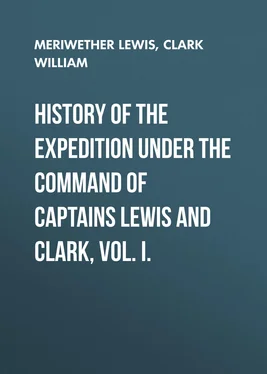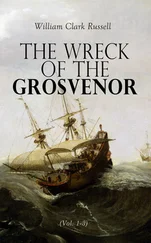William Clark - History of the Expedition under the Command of Captains Lewis and Clark, Vol. I.
Здесь есть возможность читать онлайн «William Clark - History of the Expedition under the Command of Captains Lewis and Clark, Vol. I.» — ознакомительный отрывок электронной книги совершенно бесплатно, а после прочтения отрывка купить полную версию. В некоторых случаях можно слушать аудио, скачать через торрент в формате fb2 и присутствует краткое содержание. Жанр: Путешествия и география, История, foreign_edu, foreign_antique, foreign_prose, на английском языке. Описание произведения, (предисловие) а так же отзывы посетителей доступны на портале библиотеки ЛибКат.
- Название:History of the Expedition under the Command of Captains Lewis and Clark, Vol. I.
- Автор:
- Жанр:
- Год:неизвестен
- ISBN:нет данных
- Рейтинг книги:5 / 5. Голосов: 1
-
Избранное:Добавить в избранное
- Отзывы:
-
Ваша оценка:
- 100
- 1
- 2
- 3
- 4
- 5
History of the Expedition under the Command of Captains Lewis and Clark, Vol. I.: краткое содержание, описание и аннотация
Предлагаем к чтению аннотацию, описание, краткое содержание или предисловие (зависит от того, что написал сам автор книги «History of the Expedition under the Command of Captains Lewis and Clark, Vol. I.»). Если вы не нашли необходимую информацию о книге — напишите в комментариях, мы постараемся отыскать её.
History of the Expedition under the Command of Captains Lewis and Clark, Vol. I. — читать онлайн ознакомительный отрывок
Ниже представлен текст книги, разбитый по страницам. Система сохранения места последней прочитанной страницы, позволяет с удобством читать онлайн бесплатно книгу «History of the Expedition under the Command of Captains Lewis and Clark, Vol. I.», без необходимости каждый раз заново искать на чём Вы остановились. Поставьте закладку, и сможете в любой момент перейти на страницу, на которой закончили чтение.
Интервал:
Закладка:
Sunday, October 7. There was frost again last evening, and this morning was cloudy and attended with rain. At two miles we came to the mouth of a river; called by the Ricaras, Sawawkawna, or Pork river; the party who examined it for about three miles up, say that its current is gentle, and that it does not seem to throw out much sand. Its sources are in the first range of the Black mountains, and though it has now only water of twenty yards width, yet when full it occupies ninety. Just below the mouth is another village or wintering camp of the Ricaras, composed of about sixty lodges, built in the same form as those passed yesterday, with willow and straw mats, baskets and buffaloe-skin canoes remaining entire in the camp. We proceeded under a gentle breeze from the southwest: at ten o'clock we saw two Indians on the north side, who told us they were a part of the lodge of Tartongawaka, or Buffaloe Medicine, the Teton chief whom we had seen on the twenty-fifth, that they were on the way to the Ricaras, and begged us for something to eat, which we of course gave them. At seven and a half miles is a willow island on the north, and another on the same side five miles beyond it, in the middle of the river between highlands on both sides. At eighteen and a half miles is an island called Grouse island, on which are the walls of an old village; the island has no timber, but is covered with grass and wild rye, and owes its name to the number of grouse that frequent it. We then went on till our journey for the day was twenty-two miles: the country presented the same appearance as usual. In the low timbered ground near the mouth of the Sawawkawna, we saw the tracks of large white bear, and on Grouse island killed a female blaireau, and a deer of the black-tailed species, the largest we have ever seen.
Monday, October 8. We proceeded early with a cool northwest wind, and at two and a half miles above Grouse island, reached the mouth of a creek on the south, then a small willow island, which divides the current equally; and at four and a half miles came to a river on the southern side where we halted. This river, which our meridian altitude fixes at 45° 39' 5" north latitude, is called by the Ricaras Wetawhoo; it rises in the Black mountains, and its bed which flows at the mouth over a low soft slate stone, is one hundred and twenty yards wide, but the water is now confined within twenty yards, and is not very rapid, discharging mud with a small proportion of sand: here as in every bend of the river, we again observe the red berries resembling currants, which we mentioned before. Two miles above the Wetawhoo, and on the same side, is a small river called Maropa by the Indians; it is twenty yards in width, but so dammed up by mud that the stream creeps through a channel of not more than an inch in diameter, and discharges no sand. One mile further we reached an island close to the southern shore, from which it is separated by a deep channel of sixty yards. About half way a number of Ricara Indians came out to see us. We stopped and took a Frenchman on board, who accompanied us past the island to our camp on the north side of the river, which is at the distance of twelve miles from that of yesterday. Captain Lewis then returned with four of the party to see the village; it is situated in the centre of the island, near the southern shore, under the foot of some high, bald, uneven hills, and contains about sixty lodges. The island itself is three miles long, and covered with fields in which the Indians raise corn, beans, and potatoes. Several Frenchmen living among these Indians as interpreters, or traders, came back with captain Lewis, and particularly a Mr. Gravelines, a man who has acquired the language. On setting out we had a low prairie covered with timber on the north, and on the south highlands, but at the mouth of the Wetawhoo the southern country changes, and a low timbered plain extends along the south, while the north has a ridge of barren hills during the rest of the day's course.
Tuesday, 9th. The wind was so cold and high last night and during all the day, that we could not assemble the Indians in council; but some of the party went to the village. We received the visits of the three principal chiefs with many others, to whom we gave some tobacco, and told them that we would speak to them to-morrow. The names of these chiefs were first, Kakawissassa or Lighting Crow; second chief Pocasse or Hay; third chief Piaheto or Eagle's Feather. Notwithstanding the high waves, two or three squaws rowed to us in little canoes made of a single buffaloe skin, stretched over a frame of boughs interwoven like a basket, and with the most perfect composure. The object which appeared to astonish the Indians most, was captain Clark's servant York, a remarkable stout strong negro. They had never seen a being of that colour, and therefore flocked round him to examine the extraordinary monster. By way of amusement he told them that he had once been a wild animal, and caught and tamed by his master, and to convince them, showed them feats of strength which added to his looks made him more terrible than we wished him to be. Opposite our camp is a small creek on the south, which we distinguished by the name of the chief Kakawissassa.
Wednesday, 10th. The weather was this day fine, and as we were desirous of assembling the whole nation at once, we despatched Mr. Gravelines, who with Mr. Tabeau another French trader had breakfeasted with us, to invite the chiefs of the two upper villages to a conference. They all assembled at one o'clock, and after the usual ceremonies we addressed them in the same way in which we had already spoken to the Ottoes and Sioux: we then made or acknowledged three chiefs, one for each of the three villages; giving to each a flag, a medal, a red coat, a cocked hat and feather, also some goods, paint and tobacco, which they divided among themselves: after this the airgun was exhibited, very much to their astonishment, nor were they less surprised at the colour and manner of York. On our side we were equally gratified at discovering that these Ricaras made use of no spirituous liquors of any kind, the example of the traders who bring it to them so far from tempting having in fact disgusted them. Supposing that it was as agreeable to them as to the other Indians, we had at first offered them whiskey; but they refused it with this sensible remark, that they were surprised that their father should present to them a liquor which would make them fools. On another occasion they observed to Mr. Tabeau, that no man could be their friend who tried to lead them into such follies. The council being over they retired to consult on their answer, and the next morning,
Thursday, 11th, at eleven o'clock we again met in council at our camp. The grand chief made a short speech of thanks for the advice we had given, and promised to follow it; adding that the door was now open and no one dare shut it, and that we might depart whenever we pleased, alluding to the treatment we had received from the Sioux: they also brought us some corn, beans, and dried squashes, and in return we gave them a steel mill with which they were much pleased. At one o'clock we left our camp with the grand chief and his nephew on board, and at about two miles anchored below a creek on the south, separating the second and third village of the Ricaras, which are about half a mile distant from each other. We visited both the villages, and sat conversing with the chiefs for some time, during which they presented us with a bread made of corn and beans, also corn and beans boiled, and a large rich bean which they take from the mice of the prairie, who discover and collect it. These two villages are placed near each other in a high smooth prairie; a fine situation, except that having no wood the inhabitants are obliged to go for it across the river to a timbered lowland opposite to them. We told them that we would speak to them in the morning at their villages separately.
Читать дальшеИнтервал:
Закладка:
Похожие книги на «History of the Expedition under the Command of Captains Lewis and Clark, Vol. I.»
Представляем Вашему вниманию похожие книги на «History of the Expedition under the Command of Captains Lewis and Clark, Vol. I.» списком для выбора. Мы отобрали схожую по названию и смыслу литературу в надежде предоставить читателям больше вариантов отыскать новые, интересные, ещё непрочитанные произведения.
Обсуждение, отзывы о книге «History of the Expedition under the Command of Captains Lewis and Clark, Vol. I.» и просто собственные мнения читателей. Оставьте ваши комментарии, напишите, что Вы думаете о произведении, его смысле или главных героях. Укажите что конкретно понравилось, а что нет, и почему Вы так считаете.












